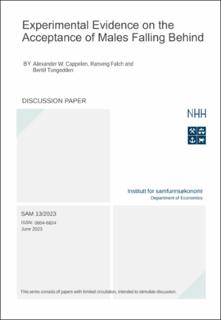| dc.contributor.author | Cappelen, Alexander W. | |
| dc.contributor.author | Falch, Ranveig | |
| dc.contributor.author | Tungodden, Bertil | |
| dc.date.accessioned | 2023-06-09T12:28:32Z | |
| dc.date.available | 2023-06-09T12:28:32Z | |
| dc.date.issued | 2023 | |
| dc.identifier.issn | 0804-6824 | |
| dc.identifier.uri | https://hdl.handle.net/11250/3070770 | |
| dc.description.abstract | In recent decades, an increasing share of males struggle in the labor market and education. We show in a set of large-scale experimental studies involving more than 30,000 Americans that people are more accepting of males falling behind than females falling behind and less supportive of government policies supporting males falling behind. We provide evidence of the underlying mechanism being statistical fairness discrimination: people consider males falling behind to be less deserving of support than females falling behind because they believe that males are more likely than females to fall behind due to lack of effort. The findings are important for understanding how society perceive and respond to the growing number of disadvantaged males. | en_US |
| dc.language.iso | eng | en_US |
| dc.relation.ispartofseries | SAM DP;13/2023 | |
| dc.subject | inequality, statistical fairness discrimination, experiment | en_US |
| dc.title | Experimental Evidence on the Acceptance of Males Falling Behind | en_US |
| dc.type | Working paper | en_US |
| dc.source.pagenumber | 60 | en_US |
| dc.relation.project | Norges Forskningsråd: 262675 | en_US |
